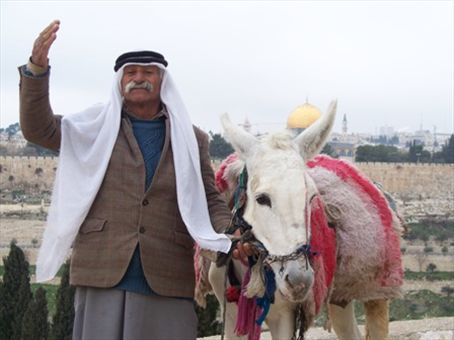Tourism and Spirituality
ISRAEL | Tuesday, 26 February 2008 | Views [1474]

Hiking up the Mt. of Olives, I ran into this guy, and had to ask for a photo.
On a roof-top cafe, Old Jerusalem is gloriously sread out before me. To the north is the Church of the Holy Sepulchre, traditionally believed to be the site of Christ's cruxificion, burial, and resurrection. To theeast, the Temple Mount, where the first and second Jewish Temples were erected, where Abraham nearly sacrificed his son Isaac, and most significantly, where sat the Sacred Altar, or "Holy of Holies." At its center sits the unmistakable Dome of the Rock, the location which for Muslims, indicates where the prophet Muhammad dreamt he ascended into heaven. Jerusalem is an exceptionally well-kept city with an unexpected European feel. The tourism industry must bring in a staggering amount of money, as even now, in late February, tourists are everywhere. Which is inevitably what takes away from the mystique of a place. Via Dolorosa, for instance, (the path traditionally believed to have been taken by Christ during his last hours) could be a poignant spiritual experience if not for the souq merchants hassling you every five minutes. In the Holy Sepulchre Church throngs of predominantly Christian tourists press against each other to view Christendom's most holy place, but to be perfecly honest, I felt little more than irritation. Firstly, it is not 100% certain that these are the exact spots of Christ's death, burial and resurrection, yet at the supposed site where they took Jesus off the cross, now marked by a highly polished slab of rock, pilgrims kneel before it, digging in plastic bags or purses for various trinkets, rubbing them (whether they be plastic crosses, books or coin purses) upon the slab in hopes of imbuing them with some sort of divine power. (At the time, This brought to my mind those whom flock to view tortillas with burn marks resembling the face of a woman (it must be Mary!) or, as happened in Portland not too long ago, the faithful few who crowded under an overpass to view "Christ's face," manifested, they say, in a combination of accumulated exhaust fumes and sludge-like runoff from the highway above). Secondly,An overpowering sense of ritual pervaded every aspect of this experience: Lighting candles, burning incense, uttering 100 (not 99!) hail Marys. I realize that symbolism can be an effective means of professing one's faith and indicating where one stands, but I can't deny the whole thing felt somehow...contrived, extravagant and generic. Christ, executed and humbly buried, is now remembered here by ornate shrines of silver and gold and intricately fashioned works of art. But of course, this begs the question: Does He deserve anything less? In spite of my, perhaps overly critical observations, Christ himself walked and talked in this very city, and that is certainly reason to pause, and reflect.
Tags: Philosophy of travel